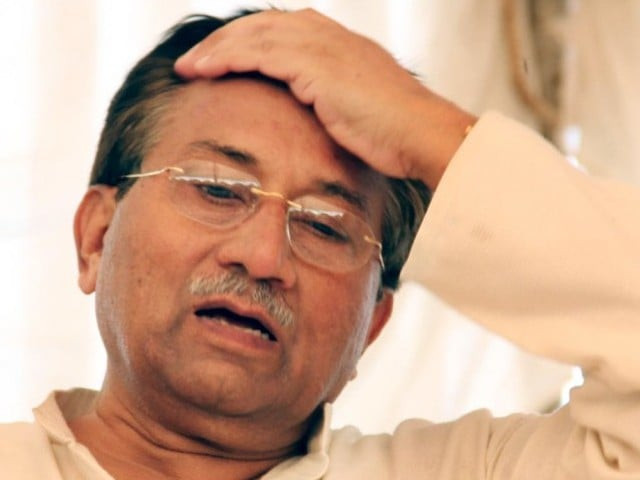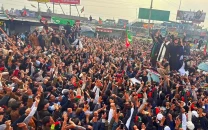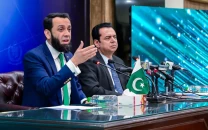Govt requests court to conclude Musharraf treason trial in his absence
Says it is not just in the interest of Musharraf but of all stakeholders including the citizens of Pakistan

Most of extradited persons sent to US in exchange of dollars, says Justice Iqbal. PHOTO: INP
“It is, therefore, respectfully prayed that this Honourable Court without waiting for the presence of the accused [Musharraf], concludes the trial and pronounces judgment on basis of available record thereby bringing the case to a close,” said the application, filed by prosecution team on Saturday.
Musharraf changes plan, 'not to return until interim setup in place'
The three-judge special court, comprising the Lahore High Court Chief Justice Yawar Ali, the Balochistan High Court judge Tahira Safdar and the Sindh High Court judge Nazar Akbar is hearing the high treason case against Musharraf for subverting the Constitution by imposing an emergency on Nov 3, 2007.
In the application, the prosecution team head Akram Sheikh narrated the whole history of the treason case, which was started in November 2013 months after the PML-N's incumbent government came into power. Even the Supreme Court had directed to conclude the trial expeditiously, said the application, whose copy is available with The Express Tribune.
The government said it is not just in the interest of Musharraf but of all the stakeholders including the citizens of Pakistan that this trial be concluded within a reasonable time. “Needless to say that this trial being unprecedented will set the tenor for any future trials of high treason,” it added.
The government claimed that it seemed from the manifest conduct of the accused that his interest is in ultimately frustrating any culmination of this treason trial. “Musharraf has categorically made statement to the media abroad that he left the country with the help of his institution, thereby, casting aspersions on armed forces and its then army chief Gen (retd) Raheel Sharif.”
The application said the treason proceedings are covered by provision of a special law, which lays down the entire manner of regulating proceedings of those who are present and of those who choose to stay away from the court.
"The law also deals with persons having poor health and declares it not to be a valid ground for adjournment of the case. The law also mandates the special court to pass a judgment notwithstanding the presence or otherwise of the accused," it said.
Section 9 of the Criminal Law Amendment (Special Court) Act 1976 says no trial before the special court shall be adjourned for any purpose unless the special court is of opinion that the adjournment is necessary in the interests of justice and, in particular, no trial shall be adjourned by reason of the absence of any accused person due to illness.
“The interest of justice can never be aligned with delay in trial; rather the interest of justice is served only by conclusion of the case. The language of this section is quite imperative and leaves no uncertainty about the intent of the legislature,” it said.
The prosecution said there is no need regarding the compliance of section 342 CrPC as it depends on the conduct of the accused. Musharraf has already availed full opportunity of cross-examining all the prosecution witnesses exhaustibly, it said.
“The object of Section 342 CrPC is to provide an opportunity to accused to explain the circumstances and give his version of events. It is a beneficial arrangement, which ensures that an accused is not taken by surprise and is designated to acquaint him with the evidence against him so as to possibly vindicate his position. The version of events and any possible vindication the accused could offer is already on file.”
It said it is a settled proposition not just in the constitutional guarantee of fair trial rights but in criminal law as well that an accused is adjudged expeditiously as necessitated by the complexity of the case so that if he is found guilty he is punished and if innocent he is acquitted.
Musharraf ruined country, now seeks security to return home: Maryam
The prosecution team also referred to high court’s verdict, which said: "The intention of the law is that a criminal case must be expeditiously disposed of without unnecessary delay." It argued that day-to-day hearing in a criminal case is the rule and adjournment is an exception.
“It is most unfortunate that the case primarily was for imposition of Martial Law, abrogating the Constitution detaining over 100 honourable Judges of the Superior Courts without any lawful authority promulgating Oath of Office (Judges) Order 2007, resulting in reconstituting the entire superior judiciary and then conferring the powers for restoring the Constitution to himself.
“In the peculiar background, facts and circumstances, the accused has tried to embarrass the country and has posed himself to be an individual more powerful than any other constitutional institution”.
It said Musharraf had publicly said he would return when he would consider it politically expedient and not otherwise, "thereby maligning the most sacred institution of the superior judiciary in Pakistan which act cannot be countenance or approved under any circumstances."
The application said the special court had directed the federal government to suspend Musharraf's CNIC and passport, which was supplemented by a letter written by the applicant's counsel to the concerned joint secretary of the Ministry of Interior, but no progress on that direction has been reported to date.



















COMMENTS
Comments are moderated and generally will be posted if they are on-topic and not abusive.
For more information, please see our Comments FAQ